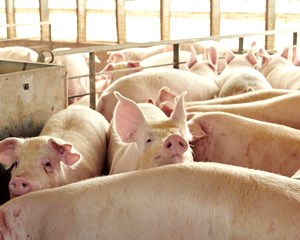United States
美国版块
Animal welfare
动物福利
The bacon crunch
培根要短缺了
California's new regulations may raise the price of pork
加州的新规定将推高猪肉价格
Bringing home the bacon is about to get harder in California. Proposition 12, a ballot initiative passed in 2018, prevents the pork, veal and egg industries from raising animals within confined spaces for all products sold within the state. And while the egg and veal industries met new rules in 2020 (43 square feet, or 13 square metres, per calf raised for veal, one square foot per egglaying hen), the pork industry may fail to meet the requirements for breeding pigs (24 square feet) by January 1st.
在加州,吃到培根(养家糊口)将变得越来越困难。第12号提案是2018年通过的一项投票倡议,该提案规定只要你在加州销售猪肉、小牛肉和鸡蛋行业产品,那产出这些产品的饲养动物就不得被限制在有限的空间里。尽管鸡蛋和小牛肉行业在2020年达到了新规定(每头小牛43平方英尺或13平方米,每只母鸡1平方英尺),但猪肉行业可能在1月1日之前无法满足种猪(24平方英尺)的要求。
California's new restrictions are part of a larger movement to release animals from cages. McDonald's, Kellogg's, Kroger's and other businesses announced plans to use only cage-free eggs by 2025. Eight states, including Massachusetts and Utah, passed laws that in effect ban eggs produced by caged hens. California's law is the most impactful on the pork industry. As the largest consumer of pig products, 116m kilos per year (about 15% of all produced in America), California's standards have weight elsewhere.
加州的这一新限制是为将动物从笼子里解放而发起的更大的运动的一部分。麦当劳、家乐氏、克罗格和其他企业宣布,计划到2025年只使用散养鸡蛋。包括马萨诸塞州和犹他州在内的八个州通过了实际上禁止了笼养母鸡产蛋的法律。加州的法律对猪肉行业影响最大。作为最大的生猪产品消费国,加州每年生产1.16亿公斤生猪产品(约占美国生猪产品总量的15%),其标准在其他地方也有分量。

The industry is, naturally, claiming that the law is unconstitutional. So far, challenges have been unsuccessful. The us Court of Appeals for the Ninth Circuit declined the National Pork Producers Council (NPPC) and American Farm Bureau Federation's petition to strike down the law in July. And the Supreme Court denied a petition filed by the North American Meat Institute a month earlier.
该行业自然会声称该法律违宪。到目前为止,这些挑战都没有成功。美国第九巡回上诉法院拒绝了国家猪肉生产者委员会(NPPC)和美国农场局联合会在7月提出的废除该法律的请求。最高法院驳回了北美肉类协会一个月前提交的一份请愿书。
Michael Formica, general counsel at the NPPC, says that the new law places an unreasonable burden on pork producers. Currently breeding pigs, which typically weigh about 225 kilograms, are placed in 14-square-foot gestation crates. Less than 4% of all sow housing meets the new standards, according to Rabobank, which finances agriculture.
NPPC的总法律顾问迈克尔·福米卡说,新法律给猪肉生产商带来了不合理的负担。目前,约225公斤重的种猪要放在14平方英尺的妊娠箱中。据资助农业的荷兰合作银行(Rabobank)称,只有不到4%的母猪养殖场符合新标准。
Activists blame the pork industry. "(They) had three years to change their housing systems. They instead chose to not comply," says Chris Green of Harvard Law's Animal Law and Policy Programme. Californians could pay the price. The Hatamiya Group, a consulting firm hired by opponents of the law, estimate that consumers could pay up to 60% more: a $6 pack of bacon could now cost $9.60. Bacon smugglers in Nevada are, presumably, licking their lips.
活动人士指责猪肉行业。“(他们)有三年时间来改变他们的住房体系,但他们反而选择不遵守,”哈佛法学院动物法律和政策项目的克里斯·格林说。加州人可能会为此付出代价。该法律的反对者雇佣的咨询公司Hatamiya Group估计,消费者可能要多支付60%的费用:一盒6美元的培根现在要9.6美元。据推测,内华达州的培根走私者正等着数钱。
译文由可可原创,仅供学习交流使用,未经许可请勿转载。











